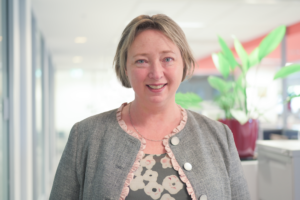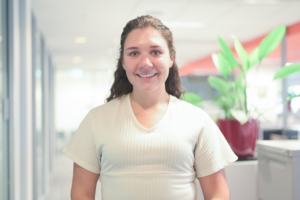The neurology department has been conducting dementia trials at the Eastern Clinical Research Unit since 2007. Over the years our trials have been beneficial in providing extended care to not only our patients but their carers as well. This is a significantly under-rated thing about what we do.
Dementia is a complex disease and there are many different types making this increasingly more difficult to understand. Our team study two prominent types of dementia; Alzheimer’s Disease (AD) and Fronto-temporal Dementia (FTD).
Medical treatments would not be possible without clinical trials and those who volunteer their time to participate. This is the most important key to our puzzle. While the main aim of our trials is to find a cure, our team places a great emphasis on improving the quality of life of our participants which is achieved through regular visits with our friendly team.
See below for more information on how to get involved
Principal Investigator- Professor Amy Brodtmann MBBS FRACP PhD
|
Her research focuses on improving the diagnostic odyssey for people with dementia and understanding vascular contributions to late-life brain health. Her vision is brain health for all: developing measures of brain health and identifying opportunities for brain health promotion. She has received many awards and grants for her work in stroke and dementia and in 2022 was awarded the Mervyn Eadie Prize, the peak mid-career award for clinician researchers from the Australian and New Zealand Association of Neurologists. She sits on the editorial boards of Neurology, Stroke and International Journal of Stroke and is on the Science Committee for the American Academy of Neurology Annual Meeting, the largest neurology conference in the world. She is an Honorary Medical Advisor for Dementia Australia, was the inaugural President of the Australasian Cognitive Neurology Association, the inaugural Chair for the Australian Chapter of the Organization of Human Brain Mapping, and a founding member of the Australian Frontotemporal Dementia Association. |
Associate Investigator- Associate Professor David Darby
|
|
Associate Investigator- Dr Maja Christensen
|
|
Neurology Team Leader- Claire McCarthy
|
Claire McCarthy is a research nurse with over 30 years’ experience in the medical field and has been leading the dementia research clinical trials unit at Box Hill for almost 10 years. Claire has a compassionate and supportive research team behind her, and she is passionate about providing opportunities to patients with dementia related cognitive impairment to have access to the latest clinical research trials. |
Study Coordinator-Kieren Walsh
|
|
Study Coordinator- Tracy Morris
|
Tracy has dedicated a career to nursing for over three decades after completing her training in the UK as a registered psychiatric nurse. After relocating to Australia in 2000, she worked as a registered nurse in various major Melbourne hospitals before transitioning to the field of neurology clinical trials in 2013. Over the years she has played a pivotal role as a study coordinator in more than seven clinical trials and has acquired experience as a rater. |
Rater- Tara O’Donoghue
|
Tara is a Registered Nurse Division 1, with an Honours degree in Psychology. She has worked in clinical trials in Neurology and Aged Care for 14 years. She has a keen interest in Dementia and improving outcomes for patients and their support network |
Project coordinator- Svetlana Ivanic
|
|
Cognitive Fellow- Antonia Clarke
|
|
Cognitive Fellow- Sarah Thomas
|
|
At ECRU we offer clinical trials for individuals with a diagnosis of Alzheimer’s disease (AD) or Fronto-temporal dementia (FTD). If you are someone or know someone with a diagnosis of AD or FTD and are interested in getting involved, please contact us for more information.
For general information about clinical trials visit the Australian Clinical Trials website.
Contact us
Dementia Trials team leader
Claire McCarthy
P: 0429 391 043
Follow our Facebook page to stay up to date with information on dementia research.
We currently have trials available for:
- Alzheimer’s Disease
- Fronto-temporal Dementia
To refer your patient to our trial’s unit, please send their contact details to the email below. Attach a referral letter stating the patient’s clinical diagnosis and any other supporting documents such as imaging etc.
Current Recruiting Trials
MINDFul: A Randomised, Placebo-Controlled, Double-Blind Study of XProTM in Patients with Mild Alzheimer’s Disease with Biomarkers of Inflammation. Phase 2. Aged, 60-85 years, MMSE 22-30, 9 months of trial related activities.
https://classic.clinicaltrials.gov/ct2/show/NCT05318976
AbbVie: A Randomized, Double-blind, Placebo-controlled, Dose-finding Study to Evaluate the Safety, Efficacy, Pharmacokinetics, and Pharmacodynamics of ABBV-552 in Participants with Mild Alzheimer’s Disease. Aged 50-90 years, MMSE 22-26, 16 weeks of trial related activities.
https://classic.clinicaltrials.gov/ct2/show/NCT05771428
SAMe: A phase II randomised, double-blind, placebo-controlled trial of S-Adenosyl Methionine in participants with mild cognitive impairment or dementia due to Alzheimer’s disease. Aged above 60 years, MMSE >17.
SELENATE: A phase 2b Randomised Controlled Trial of Sodium Selenate as a Disease Modifying Treatment for Probable Behavioural Variant Fronto-temporal Dementia. Aged >35 years, 1 year of trial related activities.
_________________________________________________________________________________
If you’re a clinician interested in staying up to date with information about our current recruiting trials and future dementia education events, subscribe to our quarterly newsletter by emailing your interest to [email protected].
Frequently Asked Questions
Anyone can participate in a trial, however, eligibility for each trial will be different. Our current trials only include individuals with a known diagnosis of Alzheimer’s Disease or Fronto-temporal Dementia. Our screening process will assess each eligibility criteria for a study to determine if you can begin on a trial.
Yes. Location is not an issue and we can reimburse you for any expenses incurred such as travel, accommodation and food. Get in touch with our team for further details.
No. Our trials have specific criteria to be eligible for a trial. We assess your eligibility for specific trials firstly during a pre-screen phone call and then secondly during screening visits where you are required to attend our site to undergo pathology, imaging and cognitive/functional assessments. This will determine whether or not you can progress onto a study.
All of our trials vary in timeline. In the past our trials have varied from 1 month to 2 years. If you begin on a trial and wish to no longer take part, you may withdraw your participation at any time.
You will have your final visit and 6-12 months after this we will be advised if you were on the study medication or placebo and we will pass this on to you. We will advise your GP of the closure of the trial and send them any of your end of study procedure reports, such as pathology, imaging reports etc. Furthermore, if you are eligible and enthusiastic about further participation, we can refer you to another clinical trial.
We will provide you with our contact details to inform us of ANY medical issues that arise during your participation. We ask you to report all medical incidents even if you believe it is unrelated.
Our doctors monitor all side effects and communicate with your GP and other clinicians involved to assess your health.
You may be asked to visit our site for an extra assessment by a doctor. Our clinicians will then make an informed decision about whether to have you continue on the medication.
Send us an email with your expression of interest and contact details and someone from our research team will get in touch with you.
- Contact + pre-screen: Your participation will involve an initial phone call from one of our staff members to complete a pre-screen checklist to see which trials you will be eligible for and to detect any obvious issues/concerns that may immediately exclude you from screening for any particular trial.
- Screening period: Before any study-related procedures are done you will be sent a participant information consent form to read and ask any questions you may have. If you agree to participate you will sign the consent form. Your study doctor will also inform your local doctor that you are participating in the research study. During the screening period, you will have various assessments and tests so that the study doctor can find out if you are eligible for the study. This may involve, pathology testing, ECGs, cognitive/functional testing along with physical and neurological assessments. The screening period is different for each study; however, you will be advised of this before you attend our site.
- Treatment period: If you are eligible to take part in the study after you complete the Screening Period, and you decide to continue, you will enter the treatment period of the study.
You can contact us directly to enquire about our clinical trials. We will require a referral form from your GP or specialist stating your diagnosis, along with any supporting documentation such as brain scans and pathology results.

 Amy leads the Cognitive Health initiative at Monash University’s Central Clinical School and leads Cognitive Neurology Services and dementia trials at the Royal Melbourne Hospital and the Eastern Cognitive Disorders Clinic.
Amy leads the Cognitive Health initiative at Monash University’s Central Clinical School and leads Cognitive Neurology Services and dementia trials at the Royal Melbourne Hospital and the Eastern Cognitive Disorders Clinic. A/Prof Darby is a cognitive neurologist with 30 years of clinical trials experience in neurology and dementia. He does trials work in three major public Melbourne hospitals.
A/Prof Darby is a cognitive neurologist with 30 years of clinical trials experience in neurology and dementia. He does trials work in three major public Melbourne hospitals. Maja is a cognitive neurologist at the Eastern Cognitive Disorders clinic and has worked with the ECRU dementia trials team since 2021. She has a special interest in atypical Alzheimer dementia and is currently undertaking a PhD in the use of artificial intelligence to improve diagnostic processes for dementia patients.
Maja is a cognitive neurologist at the Eastern Cognitive Disorders clinic and has worked with the ECRU dementia trials team since 2021. She has a special interest in atypical Alzheimer dementia and is currently undertaking a PhD in the use of artificial intelligence to improve diagnostic processes for dementia patients. Kieren is a Registered Nurse Division 1 who has worked in clinical research since 2004. He has worked for Hospitals and various Pharmaceutical companies both running and monitoring clinical trials. Kieren is passionate about discovering optimal health outcomes for his patients.
Kieren is a Registered Nurse Division 1 who has worked in clinical research since 2004. He has worked for Hospitals and various Pharmaceutical companies both running and monitoring clinical trials. Kieren is passionate about discovering optimal health outcomes for his patients. Svetlana is a recent graduate from Monash University, having completed her Bachelor of Science Honours degree. She has worked at ECRU since 2022 as coordinator of a research study involving the potential use of a blood test for dementia diagnosis. Svetlana has an interest in combining healthcare and research to improve patient care and is particularly keen on improving the accessibility of research to both clinicians and patients
Svetlana is a recent graduate from Monash University, having completed her Bachelor of Science Honours degree. She has worked at ECRU since 2022 as coordinator of a research study involving the potential use of a blood test for dementia diagnosis. Svetlana has an interest in combining healthcare and research to improve patient care and is particularly keen on improving the accessibility of research to both clinicians and patients Dr Antonia Clarke is a cognitive neurology fellow at Eastern Health. She is also a doctoral candidate at Monash University evaluating healthy brain ageing in First Nations communities living across NSW to improve culturally appropriate dementia prevention and care on Country. Alongside her cognitive interest, Dr Clarke is a clinical neurophysiologist working in regional Victoria and the Northern Territory.
Dr Antonia Clarke is a cognitive neurology fellow at Eastern Health. She is also a doctoral candidate at Monash University evaluating healthy brain ageing in First Nations communities living across NSW to improve culturally appropriate dementia prevention and care on Country. Alongside her cognitive interest, Dr Clarke is a clinical neurophysiologist working in regional Victoria and the Northern Territory.  Sarah Thomas commenced her fellowship in cognitive neurology at the ECDC and Royal Melbourne Hospital under the supervision of Prof. Amy Brodtmann and Dr. Chris Kyndt in 2024. She has mostly lived and trained in South-East Queensland, having worked at Gold Coast University Hospital and Princess Alexandra Hospital, Brisbane for her core neurology training.
Sarah Thomas commenced her fellowship in cognitive neurology at the ECDC and Royal Melbourne Hospital under the supervision of Prof. Amy Brodtmann and Dr. Chris Kyndt in 2024. She has mostly lived and trained in South-East Queensland, having worked at Gold Coast University Hospital and Princess Alexandra Hospital, Brisbane for her core neurology training.